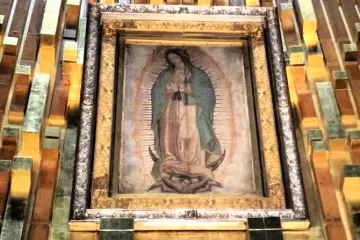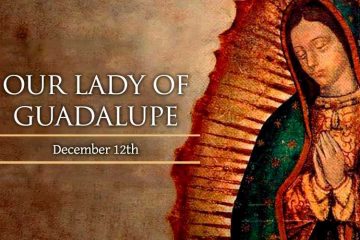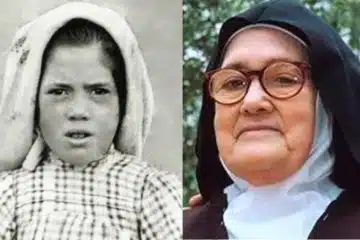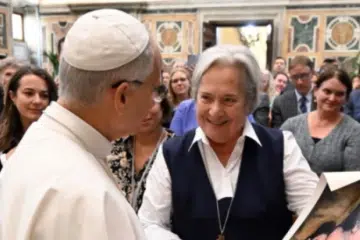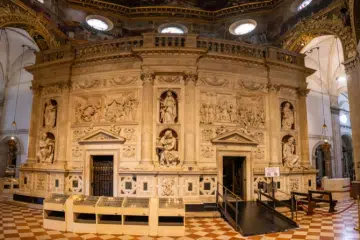“Eschatological” Man, Part Five: Embraced by Infinite Love
Note: This article is part of an ongoing series on Pope St. John Paul II’s “Theology of the Body” (TOB).
We have been exploring Pope St. John Paul II’s reflections on the resurrection of the body and life in the world to come. In that final state, the unity of body and soul will be perfected such that the body will be fully permeated by the soul, and the two will operate in complete harmony. In that resurrected state, we will maintain our maleness or femaleness, but earthly marriage will be no more (see Lk. 20:35-36; Mt. 22:30, Mk. 12:25). Pope St. John Paul II gave two reasons for this. As we saw last month, the first reason is that, in that new life, there will be no more procreation. There will be no more death and therefore no need to replenish the human race. Furthermore, there will be no need to fill the earth and subdue it, as God commanded our first parents, because in the new world, God will be “all in all” (1 Cor. 15:28; see TOB 66:2). Since procreation is one of the main purposes of marriage, without it, marriage loses one essential reason for existence.
However, there is another, profoundly theological reason the late pope gave for why earthly marriage will pass away. While procreation is one of the essential purposes of marriage, it is not the only one. Marriage is also for love and communion. Marriage is a sign, an earthly image of the infinite, loving communion in God. For all eternity, God exists in an infinite exchange of love of Father, Son and Holy Spirit, and He calls us to participate in this love. In a “plan of sheer goodness,” He created man to make him share in his own blessed life” (CCC, 1). Sharing in God’s own life means entering into the eternal exchange of divine love, which will completely fulfill and transform us. This transformative union with God has been termed “divinization” or “deification” in Catholic tradition. While we do not literally become God, He freely shares His own divine life with us as a gift of utter gratuity, a gift He offers to each one of us through Christ.
This blessed union with God has also been termed the “beatific vision,” taking inspiration from the First Letter of St. John: “Beloved, we are God’s children now; what we will be has not yet been revealed. What we do know is this: when he is revealed, we will be like him, for we will see him as he is” (1 Jn. 3:2). This face-to-face encounter with God entails an intimacy and communion greater than we could ever imagine and will fulfill the deepest longings of our hearts. As St. Augustine said, “You have made us for yourself, O Lord, and our hearts are restless until they rest in you.”
In TOB, Pope St. John Paul II spoke of the beatific vision as “God’s self-communication” of His divine perfection to man. Our response to God’s self-giving, our “yes” to His love, involves giving ourselves over to Him completely in trustful surrender. The inner life and love of the Blessed Trinity will then completely fill our entire “psychosomatic subjectivity” (67:3). Through this “participation in the inner life of God himself,” we will experience a complete “penetration and permeation of what is essentially human by what is essentially divine” (67:3). This experience of “eschatological communion” with God will be “absolutely superior to every experience proper to earthly life” (68:1,2). It will “bring to the human spirit such a ‘range of experience’ of truth and love that man would never have been able to reach… in earthly life. … Even the human body will participate, in its own way, in this eschatological experience of truth and love” (67:4).
In this experience of ultimate union with God, earthly marriage no longer makes sense. As wonderful as marriage is, the love and communion of earthly marriage is meant to be a sign and foretaste of the divine communion God is offering to us in the next life. When we get there, we no longer need anticipatory signs because we will be filled-to-overflowing with the full reality of Infinite Love. In this state, we will also experience perfect communion with every other human person united to God in love (i.e., the communion of saints). Thus, in light of our transformative union with Divine love and perfect communion with all others in God, there is in a sense “no room” to belong to another human being in an exclusive way like we do in earthly marriage. We will not experience this as any form of loss but as a superabundant fulfillment of all our longings, even those that we currently seek to fulfill through marriage.
 Dr. Andrew Sodergren is a Catholic psychologist and director of psychological services for Ruah Woods. He speaks on the integration of psychology and the Catholic faith. He and his wife, Ellie, have five children.
Dr. Andrew Sodergren is a Catholic psychologist and director of psychological services for Ruah Woods. He speaks on the integration of psychology and the Catholic faith. He and his wife, Ellie, have five children.
This article appeared in the February 2025 edition of The Catholic Telegraph Magazine. For your complimentary subscription, click here.




